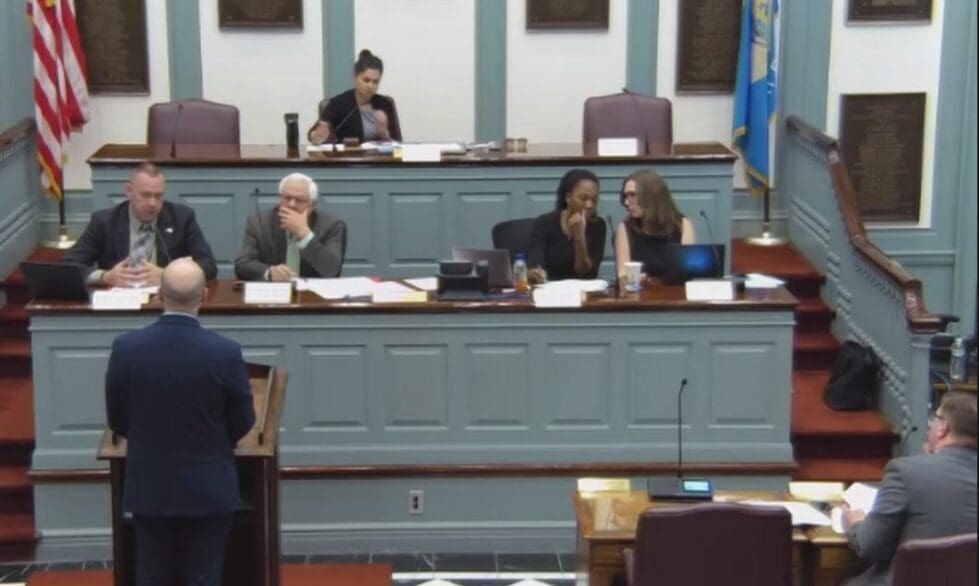
Sen. Brian Pettyjohn, left, questions Brian Frazee of the Delaware Healthcare Association during Tuesday’s Senate Executive Committee hearing on HB 350.
A controversial bill that will establish a board to review and change hospital budgets is headed to the Senate floor after a lively committee hearing.
There were some surprises and revelation of a compromise in the Senate Executive Committee Tuesday evening.

Kara Odom Walker
Surprise one: Dr. Kara Odom Walker, who was secretary of the Delaware Department of Health and Social Services when it established the state healthcare benchmark, told the Senate Executive Committee that House Bill 350 was a bad bill as written and would hurt hospitals.
The bill will require hospitals to create budgets that rise no more than the state healthcare benchmark, which is tied to the rise in Delaware’s gross domestic product and has ranged from 3% to 3.8%,
Walker, who now works for Nemours Children’s Health, said she was board member
Surprise two: Sen. Bryan Townsend, D-Newark, the Senate sponsor of HB 350, said a bill is being worked on that will look at pharmaceutical costs, but it is unlikely to be ready before the end of the session, which is June 30.
He said that the bill sponsors were aware that other medical groups needed to be involved in any focus on the costs of healthcare.
The compromise: The bill had demanded hospitals immediately lower their charges to no more than 250% of what Medicare pays for the same services as soon as the bill is passed — and hold that for as long as two years until the Diamond State Hospital Cost Review Board is expected to be up and running.
Hospitals said the amount of money that would cut from their revenues would mean that they could no longer participate in a plan to be taxed at 3.58% so the state could qualify for an additional $100 million in Medicaid under Senate Bill 13, sponsored by Sen. Sarah McBride, D-Wilmington.
Instead, hospitals are now expected to be held to charging no more than the core regional Consumer Price Index, plus one point. The region includes Wilmington, Philadelphia and Camden, New Jersey.
Brian Frazee, executive director of the Delaware Healthcare Association, a hospital and healthcare trade group, said that while that will solve the dilemma and keep the Medicaid assessment alive, hospitals still have problems with other parts of the bill.
Sen. Brian Pettyjohn, R-Georgetown, said he wanted to know why the change wasn’t acknowledged with an amendment or change in the bill, and was told it would be changed.
In the meantime, House Majority Whip Kerri Evelyn Harris was filing a new bill, House Bill 395 which will make that change.
A new bill also would prevent an amended HB 350 from having to go back through the House, where Republicans dramatically filibustered the bill for three hours before Dems silenced them so it could be passed.
“The removal of that provision and the inclusion of CPI does indeed eliminate any conflict between the text of HB 350 and the text of SB 13,” McBride said Tuesday night. “I have always said that I believed that the legislative process would result in these two bills working together, whether that was through potential changes to HB 350 or SB 13.”
Walker and Vermont hospitals
Walker, who fought with hospitals for months over the establishment in 2018 of a healthcare cost benchmark, finally agreed to create one that — as “The Pirates of the Caribbean” — would be more of a guideline than hard and fast rule.
So it was surprising that as a witness called by Pettyjohn, she argued that HB 350 should not be passed.
Walker also serves on the University of Vermont Health Network Board, she told the committee.
She and another Vermont doctor said that the Green Mountain Care Board there was created in order to help form a single payer health system in the state. When that failed, the board began focusing on hospital budgets, but also has control over other healthcare businesses, including who gets to offer new services.
“It was intended to create collaboration with the health system,” Walker said. “It went sideways and certainly did not allow for that innovation to live up to its full potential.”
Today, she said, many Vermont hospitals are operating in the red because of that government interference and have closed access points.
Pettyjohn asked her if she thought Delaware patients would end up seeking healthcare in Pennsylvania, Maryland and elsewhere, and she said they would if they could when wait times long or services were busy.
Innovation and reduced costs are needed, but the bill doesn’t do anything to focus on that in a collaborative way, Walker said.
“The way to get there is not by just cutting costs and creating more pressures and moving away from investments,” she said. “It really requires that collaboration, and I think you’ve heard that now in all the remarks that the collaboration is essential.
“We need to make sure that we’re coming together with the right mission and direction that’s not just about … hospital spending, but includes all of the costs that are incorporated in the health care.”
Democrats and those involved with the bill repeatedly attacked the hospitals and their trade association, saying they have mischaracterized the bill and were using fear tactics to motivate people to help stop the bill.
In his opening statement, Townsend said, the hospitals had not been cooperative.
“I really don’t have a good explanation for it other than change is hard, and accountability and transparency can be hard,” Townsend said. “And that I guess at the end of a very long road, there still is some hospital or hospitals in Delaware that just don’t agree with the … longtime coming type of framework.”
Health care costs are among the highest in the country, he said, despite many state efforts in the last decade to help control them.
He and David Bentz, a former member of the House of Representatives who has been working at DHSS since leaving the House, said that the original bill had been built to reflect the Diamond State Hospital Cost Review Board.
The second version of the bill added Massachusetts’ use of a performance improvement plan that the state board could use if a hospital was repeatedly not making its benchmark goals.
Hospitals account for 42% of state healthcare spending, sponsors have said.
“And this is an effort to get at one of those identified cost drivers in the state,” he said. “I know that this has become a contentious bill with the hospitals. This is not meant to be an attack … This is really just looking at one of the cost drivers as identified and developing a policy to try to address it.
Bayhealth CEO Terry Murphy later testified that the bill read like an attack, and quoted passages from it.
RELATED STORY: State moves to control hospital budgets to lower healthcare costs
RELATED STORY: Hospital board bill could threaten Medicaid’s $100 million new money
RELATED STORY: House Dems silence Republicans to move Speaker’s hospital board bill
One of Townsend’s witnesses and supporters was Jeff Taschner, executive director of the Delaware State Education Association, the teachers’ union. He cited example after example of high healthcare costs in Delaware and urged the committee to pass the bill.
Among the public commenters were a slew of healthcare professionals who said the bill would limit local control and hospital investment, and business leaders who opposed the bill because it could have a chilling effect on new and expanding business in Delaware.
In a statement released after the vote, Townsend said the sponsors “want to make crystal clear that no version of this bill ever proposed making a single decision about what treatments are right for you and your family. That is what we trust our dedicated and hard-working doctors and nurses to do.”
“This policy debate is about making healthcare more affordable for you and your families,” he said in the statement. “It’s about making sure that healthcare experts who are more accountable to the taxpayers have agency over healthcare pricing.”
HB 350 is expected to blow through the Senate, where Democrats have a supermajority, allowing them to pass bills without a single Republican vote.
The Senate agendas for Wednesday and Thursday were not posted yet on the GA’s website, as of 8 p.m. Tuesday.

Betsy Price is a Wilmington freelance writer who has 40 years of experience, including 15 at The News Journal in Delaware.
Share this Post




